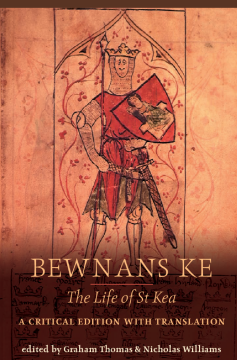
Additional Information
Book Details
Abstract
In 2000, a sixteenth-century manuscript containing a copy of a previously unknown play in Middle Cornish, probably composed in the second half of the fifteenth century, was discovered among papers bequeathed to the National Library of Wales, Aberystwyth.
This eagerly awaited edition of the play, published in association with the National Library of Wales, offers a conservatively edited text with a facing-page translation, and a reproduction of the original text at the foot of the page – vital for comparative purposes. Also included are a complete vocabulary, detailed linguistic notes, and a thorough introduction dealing with the language of the play, the hagiographic background of the St Kea material and the origins of other parts in the work of Geoffrey of Monmouth.
The theme of the play is the contention between St Kea, patron of Kea parish in Cornwall, and Teudar, a local tyrant. This is combined with a long section dealing with the dispute over tribute payments between King Arthur and the Emperor Lucius Hiberius; Queen Guinevere’s adultery with Arthur’s nephew Modred; the latter’s invitation to Cheldric and his Saxon hordes to come to Britain to assist him in his conflict with his uncle; and Arthur’s battle with Modred.
Winner of the 2008 Holyer An Gof Award for Cornish language publications.
Bewnans Ke is a text of global significance, and one in which the literary link to King Arthur is fully established.
The discovery of the manuscript has brought about what in my view is another monumental event in the development of Cornish language and literary studies – Thomas and Williams’ translation and edition of the play, published in 2007 by the University of Exeter Press in association with the National Library of Wales.’
‘Thomas and Williams’ version raises the bar considerably and must now be the standard to which others work toward. What makes Thomas and Williams’ work compulsive is its comprehensiveness. ‘This is the look and feel of confident, modern, and uncompromising Cornish literary studies....the production values of this publication simply leave other Cornish-language material standing. It is also encouraging to see a major University Press take such interest in Cornish literature.
At the turn of the millennium an announcement was made which astonished and delighted those interested in Cornish language and literature - a manuscript containing a hitherto unknown play in Middle Cornish has come to light. Academics and enthusiasts avidly seized on the text, and one of the results was the publication in 2007 of Bewnans Ke / The Life of St Kea, edited to critical acclaim by the Celtic scholars Graham Thomas and Nicholas Williams.
[...] the Thomas/Williams edition seemed set to become the standard printed text. It is this text which has now been reissued in an attractive and convenient paperback version, and it is to be hoped that the much lower price will encourage more people to study and enjoy this fascinating play.
This edition of Bewnans Ke provides a reliable text together with a guide through its many difficulties. The play is an essential addition to the resources of any student of Cornish language and literature.
Peter Thomas
This attractively produced and bound book presents the text of a newly discovered play in Middle Cornish...The editors have done everything to make this text accessible. it is beautifully and spaciously laid out for easy reading and is faced by an English translation which itself has considerable dramatic power.
The language of this translation is direct and racy. The accumulative effect of the envoy's testimonies of their rulers' allegiance to the great potentates is almost hypnotic in its power. A very full introduction includes a summary of both Albert le Grand's ''Life of St Ke" and of the play, and they are compared to each other.
As Graham Thomas observed at the time of discovery of the manuscript, Bewnans Ke may be the only medieval Arthurian play to have survived. Now, it is wonderful to have this edition to study for its historical interest and its Arthurian puzzle, and to read for its sheer entertainment value. The present volume, attractively produced in a chunky but portable hardback with book mark, will be a splendid addition to libraries and to the collections of Arthurian specialists, but a rather more economically priced paperback is highly desirable so that both the text itself and the editors’ hard work can receive the attention deserved. We can hope to hear much more about Bewnans Ke.
Linda Gowans
Thomas and Williams’s critical edition, featuring the edited Cornish text with English translation on facing pages, accompanied by the uncorrected manuscript text at the bottom of each page, a meticulous linguistic analysis, and well-considered textual notes, makes an invaluable contribution to the study of Cornish language and literature.
Jointly edited by Graham Thomas, formerly of the Department of Manuscripts and Records, National Library of Wales, and Nicholas Williams, Senior Lecturer in the Department of Modern Irish, University College, Dublin, who has published widely on Irish and Cornish literature and language.
